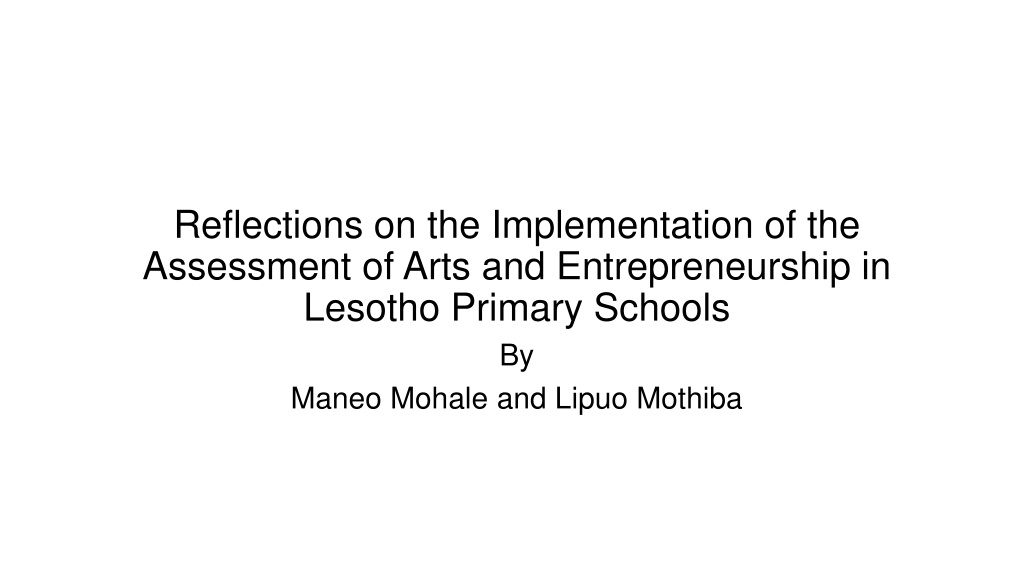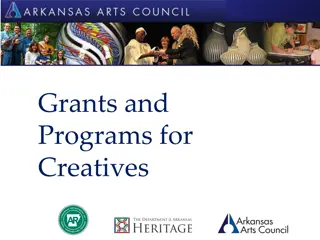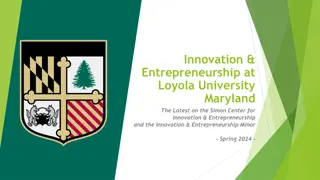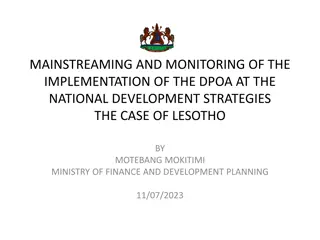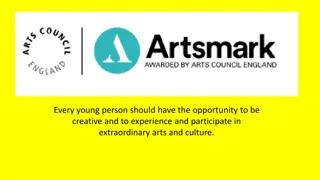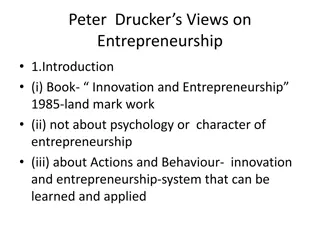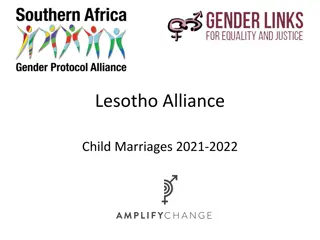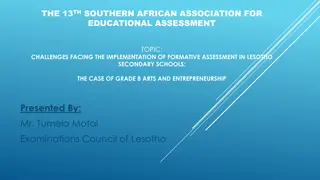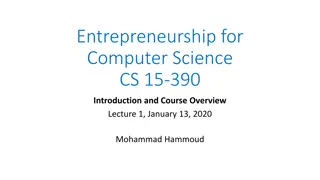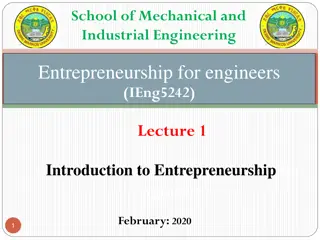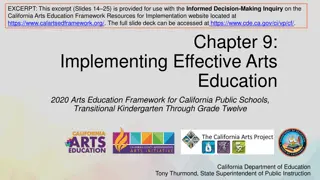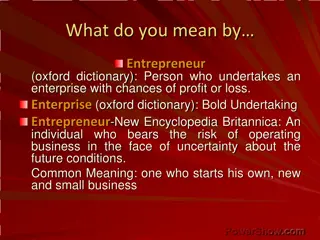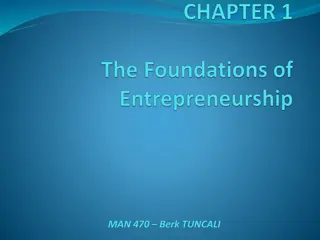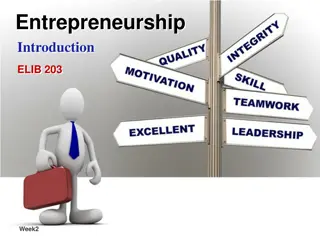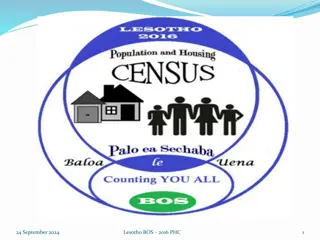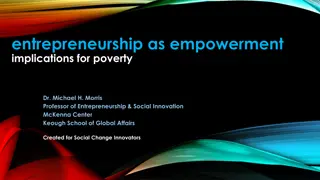Implementation of Arts and Entrepreneurship Assessment in Lesotho Primary Schools
The Ministry of Education and Training in Lesotho has introduced Arts and Entrepreneurship as a new subject in the primary school curriculum to cater to learners' diverse abilities. This paper explores the implementation of project-based assessment for Arts and Entrepreneurship, focusing on creativity and entrepreneurial skills. Unlike traditional exams, learners design and create a product based on a theme, which is then evaluated using a scoring rubric. The assessment aims to identify and develop gifted learners in the arts, encouraging them to pursue pathways where their skills can be further honed for potential livelihood opportunities.
Download Presentation

Please find below an Image/Link to download the presentation.
The content on the website is provided AS IS for your information and personal use only. It may not be sold, licensed, or shared on other websites without obtaining consent from the author. Download presentation by click this link. If you encounter any issues during the download, it is possible that the publisher has removed the file from their server.
E N D
Presentation Transcript
Reflections on the Implementation of the Assessment of Arts and Entrepreneurship in Lesotho Primary Schools By Maneo Mohale and Lipuo Mothiba
Background Since independence, education in Lesotho has been seen as a tool to eradicate poverty and promote socio-economic development (Ministry of Education and Training, 2009). As a response to these challenges, the Ministry of Education and Training (MoET) developed the Curriculum and Assessment Policy of 2009 to guide and direct how national curriculum, pedagogy and assessment should be reformed to address the high levels of repetition and drop outs rates, and to also make education responsive to the changing needs of society (Ministry of Education and Training, 2016). The policy envisages three pathways the learners can follow after completing Grade 8 (MoET, 2016), namely, academic, artisan or vocational stream of education.
The Curriculum and Assessment Policy Emanating from the policy, a new curriculum, which adopted an integrated approach to teaching, was developed and has been implemented in Grade 1 to 8. Through these reforms, the learners no longer sit for Primary School Leaving Examinations (PSLE) at the end of grade 7, but write an End- of- Level assessment aimed at checking what they know and can do. Basically this was a strategy to remove barriers for learners to access basic education and ensure that all learners at least complete ten years of schooling.
Arts and Entrepreneurship New subjects have been added to the Basic Education syllabus to cater for the needs of learners of different abilities. Among them is Arts and Entrepreneurship, which is the focus of this paper. It is based on the Creativity and Entrepreneurial learning area. The content is obtained from subjects such as Business Education, Arts and Crafts, Music and Drama. It is aimed at identifying learners who are gifted in the arts so they can be assisted to choose a pathway where their skills will be sharpened further so they can make a livelihood out of them.
Assessing Arts and Entrepreneurship The subject, contrary to others, is assessed not through the conventional pen- and-paper tests, but through a project work that is developed by the Examinations Council of Lesotho, then sent to schools at the beginning of the year. It entails each learner designing, planning, collecting materials for, and constructing a product/artefact of their own choice, based on a given theme, then costing it for sale. Teachers are then expected to assist learners through the project throughout the year and assign The teachers are provided with the scoring rubric to score learners projects or artefacts. Scores are allocated for different stages of the project. At the end of the year the scores are sent to ECoL for inclusion in the Statement of Achievement.
Rational for the project based assessment for Creativity and Entrepreneurial learning area The project-based assessment, is intended to provide learners with the opportunity to tackle real world situations as it allows application of multi-faceted skills, such as critical thinking, problem solving etc. during project development. Project-based assessment gives opportunity to measure the higher order thinking skills which learners need in real life situation
Contd. This kind of assessment is formative in nature and encourages learner-centred approach. For example, the Curriculum and Assessment Policy states that: the reliance on the summative paper and pencil examinations should be supplemented by authentic assessment strategies that indicate what the learners know and are able to do.
Objectives of the study The study was carried out to establish: whether the results submitted indicate an understanding, on the part of the teachers, of their role in the administration and scoring of the task. Whether the results they presented can be used in assisting learners to make relevant/suitable pathway choices.
Methodology In this study data was collected from the documents namely, learners scores card for A & E and scores from other centrally marked subjects for the same year. Score cards were selected randomly from the database and the content thereof analysed and summarised.
Grade 7 End of Level Achievement Test STATEMENT OF ACHIEVEMENT November 2017 CANDIDATE NUMBER: Subject Overall achievement level ENGLISH SESOTHO MATHEMATICS SCIENCE AND TECHNOLOGY SOCIAL SCIENCE LIFE SKILLS BASED SEXUALITY EDUCATION ARTS AND ENTREPRENEURSHIP Below Basic Proficient Basic Basic Basic Late Advanced
Recommendations More teacher training and support Monitoring of practices Moderation of teachers scores. Further research into teachers views and their level of readiness to administer the task and what support they require.
